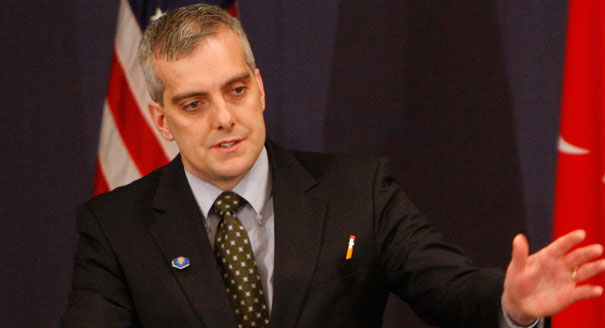White House Chief of Staff Denis McDonough called for the end of the Zionist “50-year occupation” and doubled down on the Obama administration’s critique of Zionist Prime Minister Benjamin Netanyahu.
 White House Chief of Staff Denis McDonough called for the end of the Zionist “50-year occupation” and doubled down on the Obama administration’s critique of Zionist Prime Minister Benjamin Netanyahu, in a warmly received speech to the lobbying group J Street in Washington Monday.
White House Chief of Staff Denis McDonough called for the end of the Zionist “50-year occupation” and doubled down on the Obama administration’s critique of Zionist Prime Minister Benjamin Netanyahu, in a warmly received speech to the lobbying group J Street in Washington Monday.
Speaking to the dovish group’s national conference, McDonough became the latest in a series of Washington officials to highlight the administration’s displeasure with Netanyahu, while also talking up the permanence of US-Zionist entity ties, repeating Washington’s commitment to continued military, security and intelligence cooperation.
“No matter who leads Israel, America’s commitment to Israel’s security will never waiver,” McDonough said.
At the same time, McDonough said later, “an occupation that has lasted for 50 years must end,” referring to the Zionist 48-year hold on the West Bank.
He also warned Israel’s next government not to consider unilateral annexation of any West Bank territory, saying it would “be both wrong and illegal,” and that America would strenuously object.
“Israel cannot maintain military control of another people indefinitely,” he said. “An occupation that has lasted for almost 50 years must end.” He denied claims that the administration’s reevaluation of its approach to the peace process stemmed from U.S. President Barack Obama’s “personal pique” with Netanyahu, but he described Netanyahu’s remarks before the election as “troubling.”
The longtime confidant to US President Barack Obama said that the administration believes that “the best way to safeguard Israel’s long-term security is to bring about a comprehensive peace between Israelis and Palestinians.”
Washington, he said, “has long advocated direct negotiations” toward a two-state solution — a position, he noted, that Netanyahu embraced in his 2009 speech at Bar-Ilan University.
“That’s why the prime minister’s comments on the eve of the election, [which] made very clear that a Palestinian state will not be established while he is prime minister, were so very troubling,” McDonough said, referring to comments made by Netanyahu in a pre-election interview with the NRG website in which he seemed to take a Palestinian state off the table.
McDonough rejected Netanyahu’s claims that he had not changed his position, as well as Netanyahu’s explanation that conditions in the Middle East must be more stable for a Palestinian state to be established.
“We cannot simply pretend that these comments were never made,” McDonough proclaimed, receiving a standing ovation from the 3,000-person audience.
McDonough called into question Netanyahu’s sincerity regarding the two-state solution.
“After the election, the prime minister said that he had not changed his position, but for many in Israel and in the international community, such contradictory comments call into question his commitment to a two-state solution, as did his suggestion that the construction of settlements has a strategic purpose of dividing Palestinian communities and his claim that conditions in the larger Middle East must be more stable before a Palestinian state can be established,” he said. “We cannot simply pretend that those comments were never made, or that they don’t raise questions about the prime minister’s commitment to achieving peace through direct negotiations.”
McDonough did not address the possibility that the focus of the peace process would move to the United Nations – which may indicate a softening of that position compared to what was said immediately after last week’s election results became known - but said that Obama would “never stop working for a two-state solution,” despite the difficulties. He also detailed what the U.S. believes the arrangements would be: borders based on the 1967 lines with mutually agreed swaps, security arrangements, and a “sovereign and sustainable” Palestinian state.
In what seems like wishful thinking given the presumed makeup of the next government, McDonough said the United States expects it to “to match words with actions and policies that demonstrate a genuine commitment to a two-state solution.” In an unusual move, McDonough also warned against any unilateral annexation of lands in the West Bank, saying it “would be both wrong and illegal,” that America would never support it, “and it’s unlikely Israel’s other friends would either. It would only contribute to Israel’s isolation.”
As the deadline for a political framework agreement with Iran approaches at the end of the month, McDonough said that “diplomatic engagement with Iran has already delivered concrete results.”
McDonough also described J Street, which is ostracized by much of the American Jewish establishment, as the White House’s “partner” in advancing the peace process and the two-state solution.